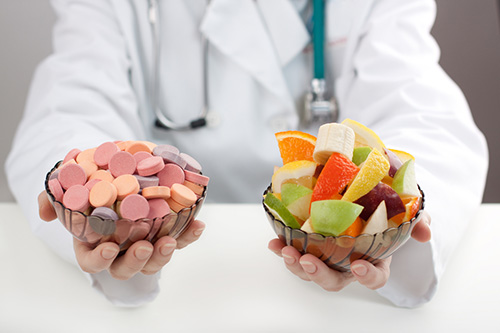As kids, it seems like someone was always telling us to take our vitamins and eat our vegetables! It’s a good thing they did, too. Vitamins are very important, especially as we age and our bodies change. But do we really know what all these vitamins are for? Where do we get them naturally so we don’t have to swallow a pill?? Let’s break it down so you can be sure you’re getting your vitamins!
There are 13 vitamins that we need on a regular basis, and we need each of them to maintain a healthy metabolism. All vitamins are either fat-soluble or water-soluble, meaning some stay in the body longer than others. The fat-soluble vitamins are stored in the fatty tissues of your body and can remain in your body as reserves for days and even months! Water-soluble vitamins, on the other hand, don’t stay in the body very long. Because our bodies can’t store them, we need to replenish them more often than the fat-soluble ones.
You may know more about some vitamins than others, but here’s a brief breakdown of what each one does for your body.
Vitamin A is vital for vision, your immune system, and reproduction. It also helps many of your major organs—the heart, lungs, kidneys, etc.—function properly. It’s fat-soluble, meaning your body stores it longer. Good sources of Vitamin A are eggs, carrots, broccoli, and sweet potatoes.
There are eight B-complex vitamins, so we’ll start with B, also known as thiamine. Vitamin B is what enables the body to use carbs as energy! It also plays a role in nerve, muscle, and heart function. It’s water-soluble—replenish often! You can get Vitamin B through beef, nuts, oats, and oranges.
Vitamin B2 is also water-soluble and is responsible for helping with the breakdown of proteins, fats, and carbs. Like Vitamin B, it helps maintain the body’s supply of energy. Fish, eggs, and dairy products are good sources of B2.
Vitamin B3, like the rest of the B vitamins, is water-soluble. It’s helpful for the digestive system, nervous system, and skin. B3 is found in meats such as liver, chicken breast, tuna, salmon, and turkey.
Though we need all the B vitamins, B5 is one of the most crucial. Our bodies need it to make red blood cells! You can get it through pork, chicken, salmon, whole grain breads and cereals, and dairy products. B6 is also important—we need it for proper brain development and function. It helps the body produce serotonin, which is vital for mood regulation. You can get your B6 by eating pork, turkey, fish, starchy vegetables, and whole grains.
Vitamin B7 is necessary for strengthening hair and nails, and is commonly referred to as biotin. We also need B7 for the creation of enzymes—this relates to having a healthy metabolism. You can find B7 in nuts, seeds, liver, and egg yolk.
Vitamin B9, also known as folic acid, plays a large role in mental health. There’s a high concentration of B9 in dark green leafy vegetables such as spinach. Lentils and black-eyed peas also serve as a good source of B9.
The final vitamin in the B-complex is B12, which keeps the body’s blood cells healthy and aids in making DNA. Having ample B12 protects against anemia. B12 is found in liver, kidneys, clams, sardines, tuna, and beef.
Vitamin C—we all know about this one! It needs to be replenished often since it’s water-soluble. Vitamin C is vital to the body’s ability to heal. It also helps absorb and store iron. Chili peppers, guavas, thyme, parsley, kale, broccoli, and oranges are great foods for getting this vitamin!
Vitamin D is important for bone health! It helps the body absorb calcium and is easily stored by the body. Vitamin D can be found in fatty fish such as tuna, mackerel, and salmon.
Vitamin E has many benefits including providing support for the immune system, preventing inflammation, promoting eye health, and protecting cells from free radicals. It’s fat-soluble and easily stored in the body. You can get Vitamin E by eating nuts, seeds, green leafy vegetables, and vegetable oils.
The final vitamin is K, which the body needs for blood clotting. It is fat-soluble and can be found in foods such as broccoli, edamame, collard greens, and Brussels sprouts.
As you can see, vitamins play MANY crucial roles in our bodies! We cannot function properly without them, and deficiencies put stress on our bodies, causing a number of problems! So, take care of what you’re eating, and if you need to take supplemental vitamins, do so! Your health is worth it!
Get a lifestyle endeavor on Food.
Lauren
Get Fit, Foxy and Fabulous, at Home or Away,
on YOUR schedule, on Any Device!


